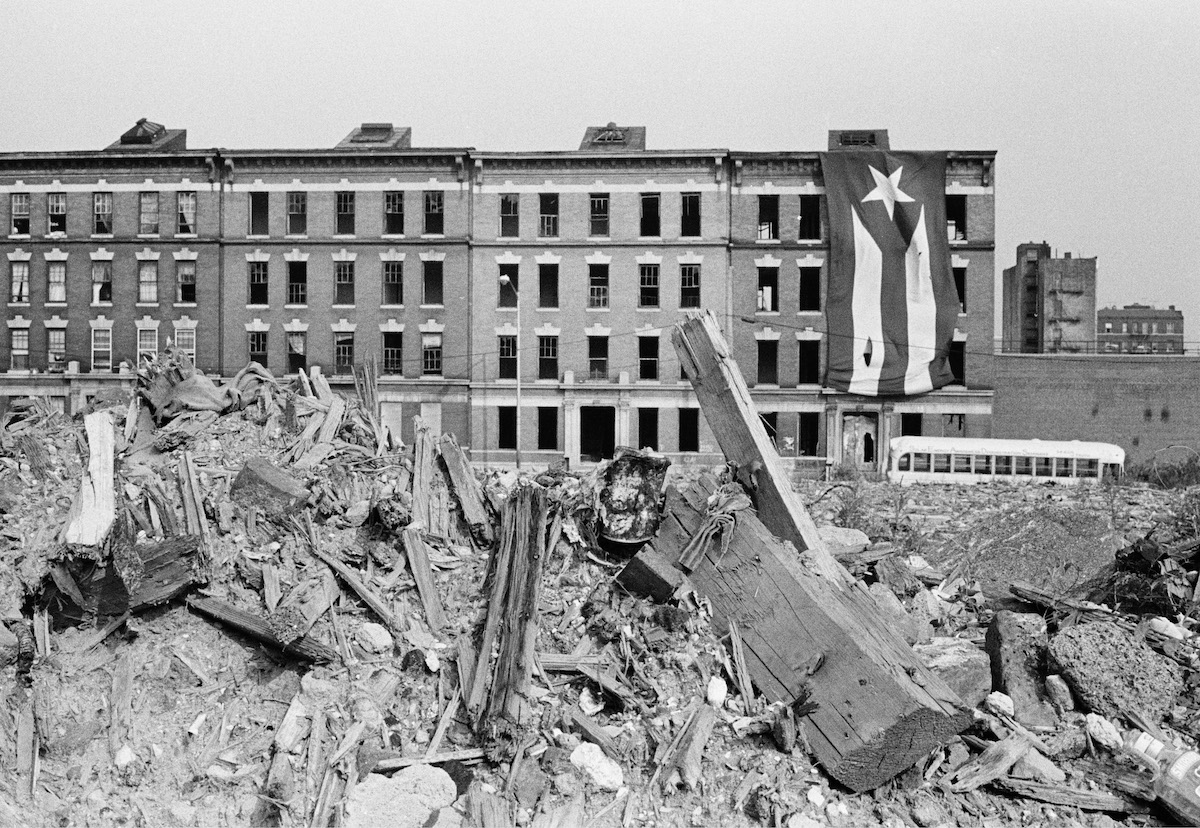Charlotte St., The Bronx. Rubble in a vacant lot with four apartment buildings in the background. A large Puerto Rican flag hangs from the rightmost building. 1980 © Joe Conzo Jr.
Set against the backdrop of landlord-sponsored arson and “benign neglect,” over 97% of seven census tracts in the South Bronx were left vacant or destroyed between 1970–80. Abandoned and left to fend for themselves, the local Black and Latino communities built a New York from the ruins. Hip Hop became the music of the streets, while disco and salsa ruled the nightclubs and airwaves. This was the landscape of photographer Joe Conzo ’s youth.

Born in the Bronx in 1963, Conzo was singularly poised to chronicle the borough during a tumultuous era of creativity and chaos. After taking up photography in 1972 at the age of 9, Conzo began carrying a camera with him everywhere he went, and developing the film and prints in a makeshift darkroom at home. Half a century later, his photographs have become both art and artifact, preserving the intricate histories of the people as only an insider could.
The new exhibition, A Look Back at the Bronx, 1977-84 is a love letter to the people of the Bronx, celebrating the indomitable spirit of joy and resistance that begins at home. “I was mentored by some good people like Frank Espada and Francisco Molina, and it was always about respecting the subject and telling a story,” says Conzo. “These are the good old days. We survived and there were some really good times.”

A third-generation Nuyorican, Conzo grew up in a tight knit family of activists headed by his grandmother, of Dr. Evelina López Antonetty (1922-1984), who earned the loving title of “The Hell Lady of the Bronx” from New York politicians and Hollywood legends alike. In 1965, she founded the community organization, United Bronx Parents, and built a powerful network of activists ready to take to the streets for their rights. Time and again, Dr. Antonetty fought City Hall and won — her work resulting in the creation of bilingual education nationwide and school meal programs for impoverished children.
“Demonstrations in Washington DC, demonstrations at the Board of Ed — that was my playground growing up,” he says. With the streets as his training grounds, Conzo readily moved between different worlds with grace, crafting a record of the era from the inside looking out. Conzo’s work stands in stark contrast to the mainstream media’s portrayal of Bronx as an outlaw state. With the rise of neorealist copaganda films like The French Connection, and The Taking of Pelham 1 2 3, Hollywood smelled blood money. In 1981, the cast and crew of Fort Apache, The Bronx descended on location to film a grisly spectacle of gang warfare, police corruption, addiction, and prostitution inspired by NYPD Captain Tom Walker’s 1976 memoir Fort Apache: New York’s Most Violent Precinct.

In response, Dr. Antonetty ignited a firestorm, organizing protests that shut down filming until the studio was forced to relent, providing jobs for locals and opening the film with a solemn disclaimer: “This movie does not portray not portray Latinos and Blacks of the Bronx accurately…”
Indeed, as Conzo’s archive shows, the histories are richly layered tapestries of New York life, revealing the exquisite intricacies of connections that readily unfold with the passage of time. As a young teen, Conzo reconnected with his father, Joe Conzo Sr., Tito Puente’s longtime confidant, after being estranged for years, a homecoming that brought him inside an extraordinary extended family. “I was meeting all these greats in Latin music: Tito Puente, Celia Cruz, the great Eddie and Charlie Palmieri, but as Tio Tito and Tia Celia. I looked at them as family.” With his camera on hand, Conzo was blessed with all access to the artists just as Latin music soared to new heights, photographing them at Madison Square Garden, Windows on the World, and Lincoln Center — as well as up in the Bronx at Lehman College Center for Performing Arts and Beau’s Restaurant.

At the same time, he was the official photographer for the Cold Crush Brothers, classmates at South Bronx High School, just as Hip Hop took the borough by storm. As the group’s official photographer, Conzo was an integral part of the culture, charting the DIY era as MCs and DJs started playing school auditoriums, the Police Athletic League, and local clubs. Now an impressive 10,000 images from his archives are now part of the Cornell Hip Hop Collection, making his work available online to the public.
“I was fortunate to be the kid from the neighborhood walking around with a camera,” Conzo says. “I was accepted more rapidly than most people were because of my connections. I was the grandson of Evelina and son of Joe so I was at the concerts and rehearsals. Even in the Hip Hop scene, it was ‘that’s Joe, he’s the main photographer, don’t worry about it.'”




Conzo: A Look Back at the Bronx, 1977-84 is on view through April 21, 2024 at the Bronx Documentary Center in New York.
You can follow Miss Rosen on Twitter



